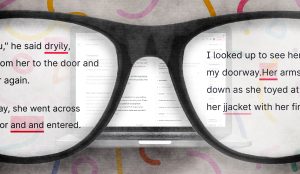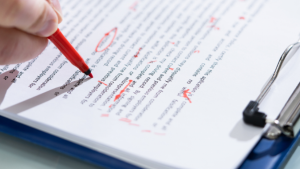
Tips for successful proofreading. Successful proofreading involves avoiding distractions and taking a break before beginning to obtain a new viewpoint. Use strategies such as reading your material aloud, reading it backwards, or copying it out on paper with a ruler to concentrate on one line at a time. Read your content slowly and attentively. Have someone else proofread it, if at all feasible, and check each pass for one kind of error (such as a spelling or grammar mistake).
TIPS FOR SUCCESSFUL PROOFREADING
Proofreading is a key skill in the realm of writing and publishing. A competent proofreader can carefully check written material for mistakes, has a strong command of language and punctuation, and has an excellent eye for detail. This tutorial will give you the necessary steps to become a proficient proofreader, regardless of whether your goal is to begin a career as a professional or hone your proofreading abilities for personal projects.
1. Develop Strong Language Skills;

A successful proofreader must have a strong command of the language they are proofreading. This includes a solid understanding of grammar, punctuation, spelling, and style conventions. Invest time in studying grammar rules, reading widely, and expanding your vocabulary to enhance your language skills.
2. Practice Regularly;
Like any skill, proofreading improves with practice. Set aside dedicated time to practice proofreading various types of content, such as articles, essays, reports, and marketing materials. Start with shorter pieces and gradually work your way up to longer, more complex documents.
3. Familiarize Yourself with Style Guides;

Different publications and organizations follow specific style guides, such as the Associated Press (AP) Stylebook or the Chicago Manual of Style. Familiarize yourself with these style guides and their rules to ensure consistency and accuracy in your proofreading work.
4. Use Tools and Resources;
Take advantage of proofreading tools and resources to streamline your workflow and catch errors more efficiently. Grammar checking software, spell checkers, and online style guides can help you identify and correct common mistakes. However, remember that these tools are aids and should not replace manual proofreading.
5. Develop Attention to Detail;

TIPS FOR SUCCESSFUL PROOFREADING
Successful proofreaders have a meticulous attention to detail and can spot even the smallest errors in written content. Train yourself to review text word by word, line by line, and pay close attention to spelling, punctuation, formatting, and overall coherence.
6. Learn to Edit and Provide Constructive Feedback;
In addition to spotting errors, a successful proofreader should also be able to edit content for clarity, coherence, and consistency. Learn how to provide constructive feedback to writers, suggesting revisions and improvements to enhance the quality of the content.
7. Build a Portfolio;

TIPS FOR SUCCESSFUL PROOFREADING
As you gain experience and confidence in your proofreading skills, start building a portfolio of your work. Include samples of documents you have proofread, along with any testimonials or recommendations from satisfied clients or employers. A strong portfolio will showcase your abilities and help you attract new clients or employment opportunities.
8. Network and Seek Feedback;
Networking with other professionals in the writing and publishing industry can open doors to new opportunities and provide valuable feedback on your work. Join online forums, attend industry events, and participate in networking groups to connect with fellow proofreaders and potential clients.
9. Stay Updated;

TIPS FOR SUCCESSFUL PROOFREADING
The writing and publishing industry is constantly evolving, with new technologies, trends, and style conventions emerging regularly. Stay updated on industry news, developments in language usage, and changes to style guides to ensure your skills remain relevant and up-to-date.
10. Pursue Continuing Education;

TIPS FOR SUCCESSFUL PROOFREADING
Consider pursuing additional training or certification in proofreading to further enhance your skills and credentials. There are numerous online courses, workshops, and certification programs available to help you refine your proofreading abilities and advance your career.
Summary
It takes effort, repetition, and a dedication to lifelong learning and development to become a proficient proofreader. You can become an expert proofreader and start a fulfilling profession in writing and publishing by honing your language abilities, practicing frequently, learning style guides, utilizing tools and resources, and assembling a portfolio.